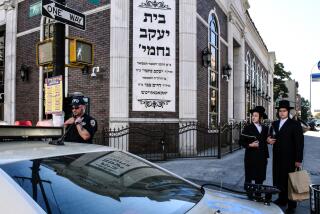After terror attacks, Muslim women say headscarves have made them targets for harassment
Reporting from HOUSTON — When Leilah Abdennabi showed up for a lunch date at a popular Austin, Texas, cafe this week, she was surprised to find her friend crying.
Through tears, her friend Sirat Al-Nahi, 20, explained that while Abdennabi was parking, an elderly white man in the cafe began harassing her, suggesting Abdennabi didn’t know how to drive and “should go back to Saudi Arabia.”
In disbelief, Al-Nahi asked the man to repeat what he had said. He did, this time adding, “Do you have a gun? You should just shoot me.”
The restaurant staff seated the man and his companion as Al-Nahi started crying.
Al-Nahi, a senior at the University of Texas at Austin and a devout Muslim who -- like her friend -- wears a headscarf, hadn’t expected to be confronted at a locally-owned restaurant in Texas’ decidedly liberal capital, an eatery that serves a dish called Nabil’s Mid-East Feast.
Abdennabi, 24, asked to speak to the manager, who said there was nothing she could do. When Abdennabi approached the man and asked him to repeat what he had said, he told her to go away.
She surveyed the restaurant.
“No one was doing or saying anything. I was like, ‘Just so you guys know, we were told some very racist things at this restaurant and no one did anything because who cares about us?’ And someone shouted ‘Nobody’,” Abdennabi told the Los Angeles Times.
In the wake of the attacks in Paris and San Bernardino, Muslim women wearing headscarves have become visible targets for harassment, often by men.
The Washington-based nonprofit Council on American–Islamic Relations has documented dozens of Islamophobic incidents nationwide since last month, including many against women wearing headscarves.
In Cincinnati, a driver tried to run down a young Muslim woman. In New York City, a customer called a female pharmacist wearing a headscarf a terrorist and told her to “get out of his country.” In San Diego, a man shoved a pregnant Muslim mother’s stroller into her belly and a San Diego State student reported a man tugged at her headscarf while yelling at her in a parking lot.
“It’s not unexpected at all. In fact, it’s what my research shows -- that Muslim women will be targeted because they are more easily identifiable; they can’t pass as non-Muslim,” said Sahar Aziz, an associate professor at Texas A&M School of Law.
Aziz researched similar harassment after the terrorist attack last January on the satirical magazine Charlie Hebdo in Paris. She found harassment ranged from assaults to microagressions, such as passing comments and stares. Now, she said, “I suspect what happened in Austin is the tip of the iceberg.”
She said it’s like women in Muslim countries being harassed for not wearing headscarves: “It disempowers women from making choices about how they practice their faith.”
In reaction, some Muslim women in the United States have stopped wearing headscarves to avoid being targeted. Aziz said immigrants may be most likely to abandon the headscarf while those like Abdennabi and Al-Nahi, born in the United States, have deeply-rooted confidence in their rights and won’t sacrifice their faith.
“It really is an individual choice based on a person’s upbringing and beliefs, particularly in the U.S.,” said Aziz, who is Egyptian American and has worn a headscarf for four years.
“Many of these women are putting the headscarf on as a feminist statement, desexualizing themselves. This needs to not just be a Muslim issue, but an American women’s rights issue.”
Abdennabi, a 24-year-old teacher’s assistant, is Palestinian American and has worn a headscarf, or hijab, since she was 18. Though she has heard some women talk recently about taking off their headscarves, she said she won’t give in.
“I don’t think we should shrink ourselves or hide ourselves. ... Unlike when I was growing up, we have Facebook and Twitter and we can share our stories,” she said.
She and Al-Nahi posted on Facebook about the incident at the cafe, drawing scores of supportive comments, including some non-Muslim men offering to escort her for her own safety. The women also received calls and a public apology posted online by Mason Ayer, the CEO of the restaurant, Kerbey Lane.
“There should be no place for racist, ignorant behavior in our society, and it’s incredibly upsetting that an incident like this occurred at all,” Ayer wrote. In retrospect, he said staff should have asked the “hateful guest” to leave.
Twitter: @mollyhf
ALSO
From a severed pig’s head to a bullet-riddled Koran, attacks on Muslims are rising
State employee investigated after allegedly hitting, throwing coffee on praying Muslim man
Why Muslims should not have to apologize for San Bernardino shooting
More to Read
Sign up for Essential California
The most important California stories and recommendations in your inbox every morning.
You may occasionally receive promotional content from the Los Angeles Times.











